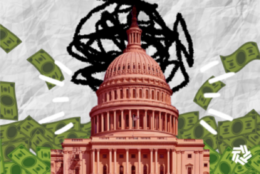Social Security Administration
-
The Social Security Administration says its new $300 million IT system still doesn't work. SSA wants to replace outdated computer systems that contribute to its backlog of disability claims. The agency says outside consultants will try to get the project back on track, but it still has no idea when it will be ready to launch. Jeff Neal is senior VP of ICF International and former chief human capital officer at the Department of Homeland Security. He's tells Francis Rose on In Depth that it's not just IT projects, but all types of federal contracts that can be where good ideas go to die.
July 24, 2014 -
The National Academy of Public Administration says the Social Security Administration is not ready for the challenges of the future. NAPA says shrinking budgets, retiring workers and rapidly changing technology are all issues that need to be addressed in the next 15 years.
July 23, 2014 -
The Office of Management and Budget revealed its plans to speed up transactions and services.
July 02, 2014 -
Internal Revenue Service and Social Security Administration employees see the results of budget cuts and sequestration. Federal News Radio Senior Correspondent Mike Causey wrote in his column "Alice in Washington Wonderland" why these cuts apply to the federal workforce on In Depth with Francis Rose.
June 23, 2014 -
Thanks to Congressional budget cutters and the White House sequestration program, two of the most important federal operations - the IRS and the Social Security Administration - are getting smaller and slower. So, how much longer can we afford these 'savings', Senior Correspondent Mike Causey asks?
June 23, 2014 -
Bill Zielinski, the Social Security Administration's chief information officer, said storage in the cloud and the greater use of virtualization are among the prerequisites for the agency before it moves into its new data center this summer.
June 12, 2014 -
Social Security's inspector general revealed beneficiaries being unfairly charged due to unauthorized account changes. SSA will make policy changes to not hold beneficiaries liable for penalties due to fraudsters stealing or taking their payments without authorization.
May 21, 2014 -
The Social Security Administration is assembling a team of disability examiners. They will use big data as one tool to spot fraud and, they hope, prevent it. Based in Jamaica, N.Y., the team is currently reviewing disability medical decisions in two cases — one in New York and the other in Puerto Rico. Bea Disman, the New York regional commissioner for the Social Security Administration, told Federal Drive hosts Tom Temin and Emily Kopp about the specialized unit.
April 11, 2014 -
Host Mike Causey will talk professional liability insurance with attorneys John P. Mahoney and David Cavanaugh. Later Andy Medici will discuss potential buyouts at the Social Security Administration and the Environmental Protection Agency. February 5, 2014
February 05, 2014 -
The early-out offer at the Social Security Administration is one of the first this year in government. Senior Correspondent Mike Causey says it could open up the promotion pipeline for younger, mid-career employees and jump-start early retirement offers in other agencies too. So how are things in your office?
January 31, 2014 -
In this week's edition of Agency of the Month, Dr. Reginald Wells, Deputy Commissioner at the Social Security Administration, discusses the human resources pressures caused by tightening budgets.
November 21, 2013 -
In this week's edition of Agency of the Month, SSA Inspector General Patrick O'Carroll explains how his office is helping the agency save millions of dollars.
November 15, 2013 -
In part two of our Agency of the Month interview with Peter Spencer, deputy commissioner for Budget, Finance, Quality and Management at the Social Security Administration, Spencer says lessons learned in 2013 will help the agency moving forward in 2014 and beyond.
November 07, 2013 -
On this week's Agency of the Month show, Peter Spencer discusses how budget uncertainty is negatively impacting the agency.
November 01, 2013 -
Preliminary figures suggest next year's benefit increase will be roughly 1.5 percent, according to an analysis by The Associated Press. The increase will be small because consumer prices, as measured by the government, haven't gone up much in the past year.
October 14, 2013





